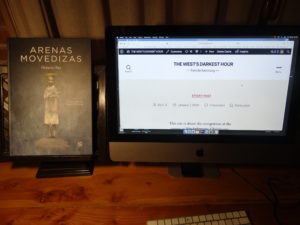It’s amazing how the knowledge I’ve been posting on this site makes me see things very differently than I thought before 2009. Currently, it is difficult for me to read normie authors that I previously loved and, as far as the racialists are concerned, well: as we have seen in my previous entries, they are pretenders of the fourteen words; not true priests of them.
I have also said that I have recently been boxing up some books from my father’s library that will go to a dead archive (inactive files), on a family property. One of the books that I didn’t know about and that I started reading today is a deluxe edition of Arenas Movedizas (Quicksands) by Octavio Paz.
Paz’s work is vast and versatile, but when talking about his literary production, very little is said about the stories that he wrote in 1949 and that he grouped under the name Arenas Movedizas. These are ten short stories that many critics have considered to be fantastic and that expose themes such as absurdity, imagination and the feelings of humans. Two years after writing them, in 1951, they were published in Paz’s ¿Águila o sol? and ten years ago the deluxe edition that we see below appeared, published in Mexico City: the edition I have in front of me.
 Today I read the first of the ten stories and I remembered that to the most insightful writer that I have known regarding literature, José Luis Vargas Moreno, who died almost a year ago and whom I nicknamed ‘El Santa’ (he looked like a dark-skinned Santa Claus!), the story bothered him because Paz apparently showed off his blue eyes. Unlike Vargas Moreno, the tale didn’t bother me but rather I was fascinated by a passage from that story, ‘El Ramo Azul’ (The Blue Bouquet):
Today I read the first of the ten stories and I remembered that to the most insightful writer that I have known regarding literature, José Luis Vargas Moreno, who died almost a year ago and whom I nicknamed ‘El Santa’ (he looked like a dark-skinned Santa Claus!), the story bothered him because Paz apparently showed off his blue eyes. Unlike Vargas Moreno, the tale didn’t bother me but rather I was fascinated by a passage from that story, ‘El Ramo Azul’ (The Blue Bouquet):
I raised my face: the stars had also set up camp above. I thought the universe was a vast system of signals, a conversation between immense beings. My actions, the saw of the cricket, the blinking of the star, were nothing but pauses and syllables, scattered phrases of that dialogue. What would be that word of which I was a syllable? [1]
It is curious how the poet sometimes comes to intuit what cosmologists who dabble in metaphysics now say, especially those who begin to intuit that consciousness plays a hidden role in the very structure of the universe.
But I couldn’t bear to read the rest of the Pacian stories. Although there was a poetic phrase from the second story that I identified with, “nuestro pequeño sistema de vida, hecho de erizadas negaciones, muralla circular que defiende dos o tres certidumbres” (our little system of life, made of bristling denials, a circular wall that defends two or three certainties), the rest of the story seemed terribly boring to me.
‘So much for so little’ said Octavio Paz in 1983 in a television program when talking about the poet Góngora of the Spanish golden age, in the sense that it was the best possible use of Spanish (as Shakespeare was of Elizabethan English) but that the message was empty. Of Paz’s second story, I would say ‘so much for nothing’. It was just the vain use of diamond language that pisses me off so much. Why?
Because even before my racial awakening I couldn’t stand those poets who revel in the form of language regardless of the content. Paz wrote his stories when the Hellstorm Holocaust was still being perpetrated in a Europe that Paz loved, but which he never knew about because he was, like every Latin American poet and writer, stuck in the form of language.
Solzhenitsyn had already made fun of this matter in his Archipelago by mentioning Proust. He called Proust’s readers foolish because by reading the famous Frenchman and ignoring reality, they failed to see the holocaust perpetrated in Russia by the communists. I cannot agree more with Solzhenitsyn (those who haven’t watched Gonzalo Lira’s video about the Russian writer should watch it now).
Despite the wise quotes above, I will put Arenas Movedizas in the boxes that will go to the dead files. Most of the book lacks these types of phrases. It’s not worth reading it. It’s like sifting through a river of mud to find a few nuggets of gold.
_____________
[1] Alcé la cara: arriba también habían establecido campamento las estrellas. Pensé que el universo era un vasto sistema de señales, una conversación entre seres inmensos. Mis actos, el serrucho del grillo, el parpadeo de la estrella, no eran sino pausas y sílabas, frases dispersas de aquel diálogo. ¿Cuál sería esa palabra de la cual yo era una sílaba?
4 replies on “Sifting through a river”
You can make a collection of new books by printing some of yours in the current Derrots world bookstore, they even sold Otto Rahn’s books and even the Mystery of Belicena Vilca by Nimord Del Rosario inspired by Frisian Book The Oera Linda, in any case it would suit you better. easy since it is your country.
Is that a publishing house, or a printer like Lulu?
Write down a link to that site please.
Mexico City
https://libreriavigenteladerrotamundial.com/
This is From Bolivia but they Print any book related with third position and paganism etc.
https://editorialdelacasadetharsis.blogspot.com/
Yes, but those are not printers like Lulu Inc., that may republish my books in English (print-on-demand services).